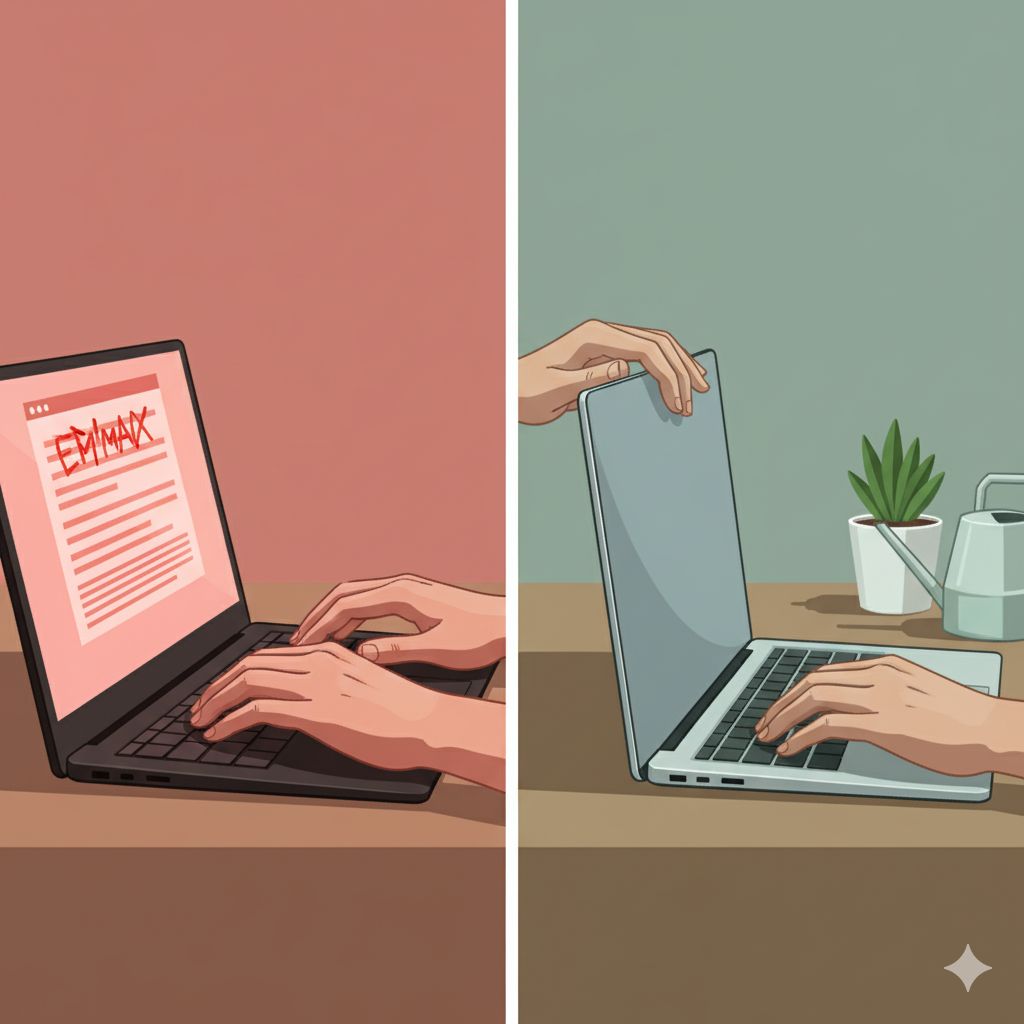- The PEN Weekly
- Posts
- That Parent Email That Makes you Want To Quit
That Parent Email That Makes you Want To Quit
A 3-step survival plan for when parents misinterpret your high standards as "meanness."


MAKING IT EASIER TO BE A BETTER TEACHER
It’s that 9:00 PM email.
The one with the subject line "Concerns about your class" that makes your stomach drop. You set high standards because you respect your students, not because you enjoy being the villain in their dinner-table narrative. You know they are capable of more, so you push them. But the parent email you just read has twisted your best intentions—your professional judgment—into an accusation of cruelty.
Welcome to one of the loneliest moments in teaching. It’s the instant you question every extra hour, every lesson plan, and the very reason you bother. Before you start drafting a fiery response or updating your LinkedIn profile, let's pause. This is a survivable—and common—crisis. There’s a way through this that doesn't involve abandoning your standards or your sanity.
🚀 Noteworthy News
👉️ Children learn to read with books that are just right for them – but that might not be the best approach
🔉 But first, a word from today’s sponsor:
Find inner peace at the piano with flowkey
Learn to play the songs that make you happy – whatever your level. flowkey gives you all you need to learn at your own pace: step-by-step courses, interactive practice tools, instant feedback, and thousands of beautiful pieces from all genres.
And now, back to our regular scheduled program 👇️
The "You Made My Child Feel Bad" Gut-Punch
Let's be clear: this feeling is a professional whiplash. You spend your days scaffolding, encouraging, and differentiating, all to help students achieve something difficult. Then, an email lands that accuses you of being "too strict," "unfair," or "making their child feel bad." It’s a gut-punch that makes you question why you’re working so hard.
This isn't really about you. It's often about a culture of parental anxiety, a fear of discomfort, and a misunderstanding of what real growth looks like. Real learning is not always comfortable, and your job is to guide students through that productive struggle. Holding high standards is an act of professional love, even when it’s misinterpreted as meanness. The attack feels personal, but the solution must be professional.
Step 1: The 24-Hour Hold (And Forward)

This is the first, non-negotiable step of what we'll call the "Professional Re-Anchor." Your only move when you're seeing red is to not move. Do not reply. Do not type a response in a Word doc to "get it all out." Do not even reply in your head. Your brain is in fight-or-flight mode, and your fight-or-flight brain is not a good diplomat.
The only action you are allowed to take is to forward the email to your administrator. Add a simple, emotion-free note: "FYI, I received this and am planning my response," or "Seeking guidance on how to address this." This one move does three critical things: It creates a record, it loops in your support system (before they get blindsided by the same parent), and it forces a crucial, cooling-off pause. Now, close the laptop. Go watch a mindless sitcom. Do not marinate.
Steps 2 & 3: Translate the Accusation, Anchor the Response
After 24 hours (and maybe a good night's sleep), it’s time for Step 2: Translate the Accusation. Read the email again, but this time as a detective, not a defendant. Your goal is to strip the raw emotion from the words to find the "professional puzzle" hidden underneath. This doesn't mean the parent is right; it means you are reframing the problem.
"You're mean and angry all the time" becomes "My classroom tone is being perceived as negative." "This assignment is intentionally confusing and unfair" becomes "The assignment's objectives may need clearer communication." "You've crushed my child's confidence" becomes "Students are feeling pressure from the new standards." See the difference? One is a personal attack; the other is a professional problem you can actually solve.
Now for Step 3: The "One Thing" Response. Your reply, if and when you send one, is not a 10-point defense of your entire teaching philosophy. It’s short, firm, and professional. You pick one professional point to "anchor" the entire conversation. It’s a polite boundary. For example: "Thank you for sharing your perspective on the recent assignment. It is always my intention to help students reach their potential. I would be happy to discuss my goals for the class at the next parent-teacher conference." It's firm. It's calm. It doesn't get drawn into an emotional back-and-forth over email.
Remember: Your Expectations Are a Form of Respect

This is the part to read and re-read when you’re feeling beaten down. Believing a student can do better is an act of respect. Giving clear, critical feedback is an act of care. In a world that often prioritizes immediate comfort over long-term competence, your job is to build resilient, capable, and thoughtful humans. That process is not always comfortable, nor should it be.
Your classroom is one of the few places left where young people can learn that "this is hard" doesn't mean "this is impossible." It's where they learn to redraft, rethink, and try again. It’s where they build the grit they will desperately need long after they’ve left your classroom.
Do not let the complaints of those who misunderstand your intent cause you to abandon your purpose. Your professional experience, your pedagogical training, and your "why" are infinitely stronger than any single, angry email. That parent doesn't see the student who finally had an "aha" moment, the quiet one you helped find their voice, or the group that finally learned to collaborate. But you do.
That's the work. The real work. It’s messy, it's hard, and it's often thankless. But it matters more than you know.
The Staff Room Wrap-Up
So, take that email and file it away in a folder labeled "Read Later (Maybe)." Go grab the good coffee from the "emergency" stash in your bottom drawer—the one you hide from the person who keeps "borrowing" your supplies. Look at the rest of your classroom.
Don't let one parent's misunderstanding overshadow the 29 other breakthroughs, big and small, that you are facilitating every single day. You are doing the real work. Put on your "professional anchor" and hold fast. You've got this.
WHAT DO YOU THINK?
We would LOVE to hear from you!
Reply to this email, or send us a message on Instagram! We’re here to walk with you in these crazy times!
Part of what makes The PEN Weekly community so special is the fact that our readers are teachers from around the world! We’re not going to lie, we think that’s pretty darn cool!
We’ll see you again on Wednesday 🍎
Do you know someone who would appreciate reading the PEN? Share this newsletter with them! Our goal is to reach as many teachers as possible, and to build a community of teachers supporting teachers.

Reply